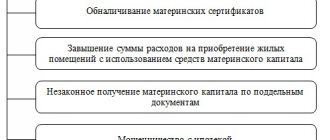ST 159.3 of the Criminal Code of the Russian Federation.
1. Fraud using electronic means of payment -
shall be punishable by a fine in the amount of up to one hundred twenty thousand rubles, or in the amount of the wages or other income of the convicted person for a period of up to one year, or by compulsory labor for a term of up to three hundred and sixty hours, or by corrective labor for a term of up to one year, or by restriction of liberty for a term of up to two years, or forced labor for a term of up to two years, or imprisonment for a term of up to three years.
2. The same act, committed by a group of persons by prior conspiracy, as well as causing significant damage to a citizen, -
shall be punishable by a fine in the amount of up to three hundred thousand rubles, or in the amount of the wages or other income of the convicted person for a period of up to two years, or by compulsory labor for a term of up to four hundred eighty hours, or by corrective labor for a term of up to two years, or by forced labor for a term of up to five years. with restriction of freedom for a term of up to one year or without it, or imprisonment for a term of up to five years with restriction of freedom for a term of up to one year or without it.
3. Acts provided for in parts one or two of this article, committed by a person using his official position, as well as on a large scale, -
shall be punishable by a fine in the amount of one hundred thousand to five hundred thousand rubles, or in the amount of the wages or other income of the convicted person for a period of one to three years, or by forced labor for a term of up to five years with or without restriction of freedom for a term of up to two years, or imprisonment for a term of up to six years with a fine in the amount of up to eighty thousand rubles or in the amount of the wages or other income of the convicted person for a period of up to six months or without it and with restriction of freedom for a term of up to one and a half years or without it.
4. Acts provided for in parts one, two or three of this article, committed by an organized group or on an especially large scale, -
shall be punishable by imprisonment for a term of up to ten years with or without a fine in the amount of up to one million rubles or in the amount of the wages or other income of the convicted person for a period of up to three years and with or without restriction of freedom for a term of up to two years.
Art. 159, part 3: sentences
A culprit who has used his official position in a crime or has committed an act on a large scale may be fined. Its value is determined by calculating the salary or other profit of the subject for 1-3 years. A fixed amount can be set from 100 to 500 thousand rubles. This sanction is the mildest punishment under the given circumstances. Art. 159, part 3 also involves forced labor. Their duration is up to 5 years. This sentence is part 3 of Art. 159 of the Criminal Code of the Russian Federation may be accompanied by an additional restriction in the freedom of the offender for up to 2 years. The article also provides for imprisonment of the subject. Its duration is up to 6 years. In Art. 159, Part 3 of the Criminal Code of the Russian Federation, punishment in the form of imprisonment may be supplemented by restriction of freedom or a fine. The size of the latter is up to 10 thousand rubles. or equal to the income/salary of the culprit for the month. Restriction of freedom under Art. 159, Part 3 of the Criminal Code of the Russian Federation - punishment, the duration of which in this case is no more than one and a half years.
Second commentary to Art. 159.3 of the Criminal Code of the Russian Federation
1. The means of committing this type of fraud are a credit, payment or other payment card used to deceive an authorized employee of a credit, trade or other organization.
Using a credit card, its owner makes transactions, settlements for which are carried out at the expense of funds provided by the bank or other issuing credit institution to the client within the established limit in accordance with the terms of the loan agreement.
A payment card is used by its holder for settlements within the limits of the amount of funds established by the issuing credit institution (spending limit), settlements for which are carried out at the expense of the client’s own funds in his bank account, or (in case of insufficient or absent funds in the bank account). own funds) - through a loan provided by the issuing credit institution in accordance with the bank account agreement.
2. The objective side of this crime is the theft of funds by deceiving an authorized employee of a credit, trade, service or other organization. Deception consists in the fact that the perpetrator pretends to be the legitimate holder of a credit, payment or other payment card, which in fact is counterfeit (by the perpetrator himself or another person) or legally belongs to another person (for example, stolen from him). This is how an authorized employee of a credit, trade or other organization is misled regarding the legality of payment using the appropriate card and the integrity of the payer.
The Plenum of the Supreme Court of the Russian Federation, in paragraph 13 of Resolution No. 51 of December 27, 2007, explained that “the theft of other people’s funds in bank accounts by using a stolen or counterfeit credit or payment card should be qualified as fraud only in those cases when a person, through deception or abuse of trust, misled an authorized employee of a credit, trade or service organization (for example, in cases when, using a bank card to pay for goods or services in a trade or service center, a person signs a purchase receipt instead of a legitimate cardholder or presents a fake passport in his name).” If the theft of other people's funds using payment cards is carried out through an ATM without the participation of authorized persons of a credit or other organization, the act constitutes theft and is qualified under Art. 158 of the Criminal Code.
3. The crime is completed from the moment of taking possession of someone else’s property or acquiring the right to it.
4. The subjective side of the crime is characterized by direct intent and selfish motive.
5. The subject of the crime is a person who has reached the age of 16 years.
6. According to Part 2 of Art. 159.3 of the Criminal Code of the Russian Federation, this type of fraud is qualified in cases where it is committed by a group of persons by prior conspiracy or involves causing significant damage to a citizen (see comments to Article 158 of the Criminal Code).
7. Fraud using payment cards committed by a person using his official position, as well as on a large scale (amounting to more than 1.5 million rubles), is recognized as especially qualified (Part 3 of Article 159.3 of the Criminal Code).
8. In part 4 art. 159.3 of the Criminal Code provides for liability for this crime if it is committed by an organized group or on a particularly large scale (i.e. in an amount exceeding 6 million rubles).
Grounds for liability
The subject of the act specified in Art. 159, part 3 of the Criminal Code, specific. According to general principles, sane individuals over the age of 16 are held accountable. As for the part under consideration, the subject may be a person who holds a certain post. Large size is another sign that makes it possible to apply Art. 159, part 3. The commentary to the norm indicates that the amount of damage in value (monetary) terms should not be more than a million rubles, but not less than 250 thousand. If the amount of harm falls outside the specified framework, other parts of the article under consideration are used.
Composition of the crime and punishment
- recovery in the amount of one hundred thousand to five hundred thousand rubles;
- forced labor for up to 5 years;
- imprisonment for up to 6 years.
The punishment under this article of the Criminal Code of the Russian Federation depends on the composition of the offense.
Illicit enrichment
For illegal enrichment, the following methods of punishment are provided:
- fine;
- various types of work;
- detention.
The amount of recovery, the period of work and arrest depend on the severity of the crime.
Extra large size
Today, large-scale fraud is recognized as the theft of money or property worth more than 250,000 rubles. If the damage to a citizen or enterprise is estimated at 1,000,000 rubles, then the act is regulated as theft on an especially large scale.
With this type of fraud, criminals face:
Amendments for loan debt
The Criminal Code of the Russian Federation provides for a statute of limitations for loan-related scams. If within three years the borrower has not made a single attempt to pay off the debt obligations, and the creditor has not gone to court, the debt is written off. In this case, the citizen who took out the loan can himself apply to the court with a request to close the loan.
Article 159.3. Fraud using electronic means of payment
Determination of the Constitutional Court of the Russian Federation dated April 20, 2017 N 767-O The special rule provided for in part one.1 of Article 108 of the Code of Criminal Procedure of the Russian Federation, according to which detention as a preventive measure cannot be applied to a suspect or accused of committing crimes under Article 159 - 159.3, 159.5, 159.6, 160 and 165 of the Criminal Code of the Russian Federation, if these crimes are committed in the field of business activity, as well as articles 171 - 174, 174.1, 176 - 178, 180 - 183, 185 - 185.4 and 190 - 199.2 of the same Code , in the absence of the circumstances specified in paragraphs 1 - 4 of part one of this article of the criminal procedure law, is an additional guarantee of the constitutional right to freedom and personal integrity (rulings of the Constitutional Court of the Russian Federation dated February 24, 2011 N 250-О-О, dated 20 November 2014 N 2637-O, etc.).
Determination of the Constitutional Court of the Russian Federation dated June 27, 2017 N 1395-O
Enshrined in part one.1 of Article 108 of the Code of Criminal Procedure of the Russian Federation, there is a special rule according to which detention as a preventive measure cannot be applied to a suspect or accused of committing crimes under Articles 159 - 159.3, 159.5, 159.6, 160 and 165 of the Criminal Code of the Russian Federation Federation, if these crimes were committed in the field of business activity, as well as Articles 171 - 174, 174.1, 176 - 178, 180 - 183, 185 - 185.4 and 190 - 199.2 of the same Code, in the absence of the circumstances specified in paragraphs 1 - 4 parts The first of this article of the Criminal Procedure Law is an additional guarantee of the constitutional right to freedom and personal integrity (Definitions of the Constitutional Court of the Russian Federation of February 24, 2011 N 250-О-О, of November 20, 2014 N 2637-О, etc.).
Resolution of the Plenum of the Supreme Court of the Russian Federation dated October 3, 2017 N 34
Taking into account the difficulties that arise in law enforcement practice when choosing a preventive measure in the form of detention and deciding whether the crime of which a person is suspected or accused belongs to the sphere of entrepreneurial activity, in part one.1 of Article 108 of the Code of Criminal Procedure of the Russian Federation it is proposed to clarify , to whom the guarantees established by this norm specifically apply in the event of committing crimes provided for in parts one through four of Article 159, articles 159.1 - 159.3, 159.5, 159.6, 160, 165 of the Criminal Code of the Russian Federation.
Determination of the Constitutional Court of the Russian Federation dated June 30, 2020 N 1424-O
According to the applicant, the contested norm allows preliminary investigation bodies and courts to bypass the legislative prohibition on the use of detention as a preventive measure against a suspect or accused of committing crimes provided for in parts one to four of Article 159, Articles 159.1 - 159.3, 159.5, 159.6, 160, 165 and 201 of the Criminal Code of the Russian Federation, despite the fact that these crimes were committed in real connection with the implementation of business activities, citing the fact that the charged act contains signs of a crime, and not legitimate business activity, and also that the crime caused harm interests of a state or municipal unitary enterprise, state corporation, state company, commercial organization with participation in the authorized (share) capital (share fund) of the state or municipal entity, or if the subject of the crime was state or municipal property.
Determination of the Constitutional Court of the Russian Federation dated July 23, 2020 N 1863-O
According to the applicant, part one.1 of Article 108 of the Code of Criminal Procedure of the Russian Federation allows preliminary investigation authorities and courts to bypass the legislative ban on the use of detention as a preventive measure against a suspect or accused of crimes provided for in parts one through four of Article 159, articles 159.1 - 159.3, 159.5, 159.6, 160, 165 and 201 of the Criminal Code of the Russian Federation and committed in real connection with the implementation of business activities, referring to the fact that the imputed act contains signs of a crime, and not legitimate business activity, and that the crime caused harm interests of a state or municipal unitary enterprise, state corporation, state company, commercial organization with participation in the authorized (share) capital (share fund) of the state or municipal entity, or the subject of the crime was state or municipal property.
Appeal ruling of the Judicial Collegium for Criminal Cases of the Supreme Court of the Russian Federation dated September 26, 2019 N 64-APU19-5
- according to Part 2 of Art. 159.3 of the Criminal Code of the Russian Federation - for 3 years 1 month of imprisonment. Based on Part 3 of Art. of the Criminal Code of the Russian Federation for the totality of crimes, by partial addition of the imposed punishments, Elisey Georgievich Matirny was sentenced to 18 years and 5 months of imprisonment, with restriction of freedom for a period of 1 year and 6 months.
Determination of the Constitutional Court of the Russian Federation dated March 27, 2018 N 834-O
These general provisions also apply to fraud in the field of lending, since in Resolution No. 32-P of December 11, 2014, the Constitutional Court of the Russian Federation indicated that Federal Law No. 207-FZ of November 29, 2012 introduced special types of fraud (Articles 159.1 - 159.3 , 159.5 and 159.6 of the Criminal Code of the Russian Federation).
Determination of the Constitutional Court of the Russian Federation dated July 17, 2018 N 2010-O
Enshrined in part one.1 of Article 108 of the Code of Criminal Procedure of the Russian Federation, there is a special rule according to which detention as a preventive measure cannot be applied to a suspect or accused of committing crimes under Articles 159 - 159.3, 159.5, 159.6, 160 and 165 of the Criminal Code of the Russian Federation Federation, if these crimes were committed in the field of business activity, as well as Articles 171 - 174, 174.1, 176 - 178, 180 - 183, 185 - 185.4 and 190 - 199.4 of the same Code, in the absence of the circumstances specified in paragraphs 1 - 4 parts The first of this article of the criminal procedure law is an additional guarantee of the constitutional right to freedom and personal integrity (rulings of the Constitutional Court of the Russian Federation of February 24, 2011 N 250-О-О, of November 20, 2014 N 2637-О, etc.).
Determination of the Constitutional Court of the Russian Federation dated February 26, 2021 N 328-O
The special rule enshrined in part one.1 of Article 108 of the Code of Criminal Procedure of the Russian Federation, according to which detention as a preventive measure in the absence of the circumstances specified in paragraphs 1 - 4 of part one of the same article, cannot be applied to a suspect or accused of committing crimes provided for in parts one to four of Article 159, Articles 159.1 - 159.3, 159.5, 159.6, 160, 165 and 201 of the Criminal Code of the Russian Federation, if these crimes were committed by an individual entrepreneur in connection with his business activities and (or) management of property owned by him and used for the purposes of entrepreneurial activity, or if these crimes were committed by a member of the management body of a commercial organization in connection with the exercise of powers by him to manage the organization or in connection with the implementation by a commercial organization of entrepreneurial or other economic activities, as well as parts five to seven of Article 159, Articles 171, 171.1 171.3 - 172.3, 173.1 - 174.1, 176 - 178, 180, 181, 183, 185 - 185.4 and 190 - 199.4 of the Criminal Code of the Russian Federation, is an additional guarantee of the constitutional right to freedom and personal integrity (determination of the Constitutional Court of the Russian Federation of February 24, 2011, 2011 year N 250-О-О, dated November 20, 2014 N 2637-О, etc.).
Determination of the Constitutional Court of the Russian Federation dated March 25, 2021 N 383-O
According to part one.1 of article 108 of this Code, detention as a preventive measure in the absence of the circumstances specified in paragraphs 1 - 4 of part one of the same article cannot be applied to a suspect or accused of committing crimes provided for in parts one - fourth article 159, articles 159.1 - 159.3, 159.5, 159.6, 160, 165 and 201 of the Criminal Code of the Russian Federation, if these crimes were committed by an individual entrepreneur in connection with his business activities and (or) management of property belonging to him, used for business purposes, or if these crimes were committed by a member of the management body of a commercial organization in connection with the exercise of powers by him to manage the organization or in connection with the implementation by a commercial organization of entrepreneurial or other economic activities, as well as parts five - seven of Article 159, Articles 171, 171.1, 171.3 - 172.3, 173.1 - 174.1, 176 - 178, 180, 181, 183, 185 - 185.4 and 190 - 199.4 of the Criminal Code of the Russian Federation. This special norm of the criminal procedural law is an additional guarantee of the constitutional right to freedom and personal integrity (rulings of the Constitutional Court of the Russian Federation of February 24, 2011 N 250-О-О, of November 20, 2014 N 2637-О, etc.).
Determination of the Judicial Collegium for Criminal Cases of the Supreme Court of the Russian Federation dated January 19, 2021 in case No. 10-UD20-12SP-A4
- according to Part 2 of Art. 159.3 of the Criminal Code of the Russian Federation to 3 years of imprisonment with restriction of freedom for 8 months; Based on Part 3 of Article of the Criminal Code of the Russian Federation, for the totality of crimes by partial addition of punishments, Khmarsky was finally sentenced to 18 years of imprisonment to be served in a special regime correctional colony, with restriction of freedom for 2 years.
Preventive measure
If a citizen is suspected or accused of a crime specified in Art. 159, part 3, the investigator/interrogator can choose any option from Art. 98 Code of Criminal Procedure. As a rule, in relation to such persons a measure is taken in the form of:
- Signs not to leave.
- Arrest (domestic).
- Collateral.
- Detention.
- Personal guarantee.
The decision to take a citizen into custody, apply a measure in the form of bail or house arrest is made exclusively in court. Taking a subscription or personal guarantee is carried out during preliminary work by authorized persons (inquirer/investigator).
Also read: Criminal prosecution under Article 159 of the Criminal Code of the Russian Federation
Arbitrage practice
Despite the fact that articles on lending fraud have appeared recently, there is already judicial practice regarding this act.
For example, a citizen overestimated his income level and provided the bank with incorrect information, as a result of which he received a loan. The defendant did not repay the loan; as a result, the bank filed a claim in court. After considering the case, the judge imposed a fine and repayment of debt obligations on the defendant.
Conclusion
- Fraud, according to the Criminal Code, is the appropriation of property belonging to another person, or the right to own someone else’s property, obtained by deception.
- Responsibility for the crime is specified in Art. 159 of the Criminal Code of the Russian Federation.
- Part 3 Art. 159 of the Criminal Code of the Russian Federation is supplemented by the condition that a citizen commits a violation of the law using official powers, and also by the fact that theft occurs on a large scale.
- Article 159.1 of the Criminal Code of the Russian Federation regulates scams in the field of loans.
- For violation of the law, the Criminal Code of the Russian Federation provides for several types of punishment - monetary penalties, compulsory labor and imprisonment.
Third commentary to Article 159.3 of the Criminal Code of the Russian Federation
1. The main feature of this type of fraud is the subject of the crime, to which the legislator classifies a counterfeit credit, payment or other payment card belonging to another person (see commentary to Article 187 of the Criminal Code). In accordance with clause 1.5 of the Regulations of the Central Bank of the Russian Federation dated December 24, 2004 N 266-P “On the issue of bank cards and on transactions performed using payment cards” (Bulletin of the Bank of Russia. 2005. N 17), credit organizations have the right to issue bank cards cards (including settlement and credit): a) a settlement (debit) card is intended for transactions by its holder within the limits of the amount of funds (spending limit) established by the issuing credit institution, settlements for which are carried out at the expense of the client’s funds located on his bank account, or a loan provided by the issuing credit institution to the client in accordance with the bank account agreement in the event of insufficient or absence of funds in the bank account (overdraft); b) a credit card is intended for its holder to carry out transactions, settlements for which are carried out at the expense of funds provided by the issuing credit institution to the client within the established limit in accordance with the terms of the loan agreement. Checks, travel tickets or receipts for payment are not the subject of this crime.
2. Some qualification issues related to these subjects are explained in the Resolution of the Plenum of the Supreme Court of the Russian Federation dated December 27, 2007 N 51 “On judicial practice in cases of fraud, misappropriation and embezzlement” (BVS RF. 2008. N 2. P. 8). In accordance with paragraph 13 of this Resolution, theft of other people's funds through the use of a previously stolen or counterfeit credit (payment) card, if cash is issued through an ATM without the participation of an authorized employee of a credit institution, should be qualified under the relevant part of Art. 158 of the Criminal Code of the Russian Federation. The theft of other people's funds in bank accounts through the use of a stolen or counterfeit credit or payment card should be classified as fraud, liability for which is provided for in the commented article, only in cases where a person, through deception or breach of trust, misled an authorized credit officer. , trade or service organization (for example, in cases where, using a bank card to pay for goods or services in a trade or service center, a person signs the purchase receipt instead of the legal owner of the card or presents a fake passport in his name).
3. Qualifying and especially qualifying characteristics are similar to those specified in Art.
159.1 with the exception of one addition. In Part 2 of the commented article, liability is also strengthened for causing significant damage to a citizen (see commentary to Article 158 of the Criminal Code). ‹Article 159.2. Fraud in receiving paymentsTop Article 159.4. Lost power. Business fraud ›





